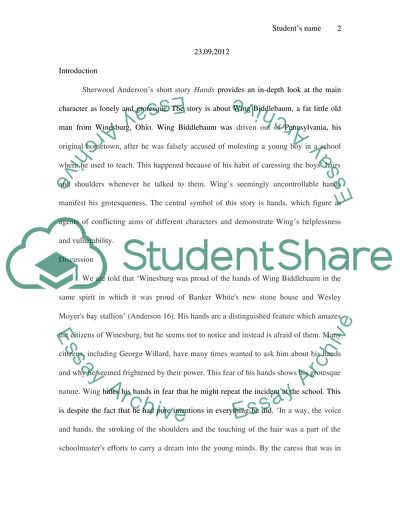In Hands by Sherwood Anderson we have the theme of isolation, loneliness, alienation, fear, freedom and connection. Taken from his Winesburg, Ohio collection the story is narrated in the third person by an unnamed narrator and very early on in the story the reader realises that Anderson may be exploring the theme of isolation and loneliness. Wing lives alone and the narrator tells the reader that Wing ‘did not think of himself as in any way a part of the life of the town where he had lived for twenty years.' This line is significant as it not only highlights to the reader the idea of loneliness and isolation but it also serves to inform the reader that for twenty years Wing has isolated himself from others or at least has not felt as if he was part of the community. However it is also significant that Wing is waiting for George Willard. Though George is mainly absent from the story, by introducing him to the reader, Anderson manages (or succeeds) in introducing the theme of connection. Despite isolating himself from those around him (and those who live in the town), Wing still feels the need to connect with others, in this case George Willard.
- Symbolism In Hands By Sherwood Anderson Author
- Hands Sherwood Anderson Theme
- Symbolism In Hands By Sherwood Anderson
- Symbolism In Hands By Sherwood Anderson Foundation
Symbolism In Hands By Sherwood Anderson Author
This paper analyses characters of three short stories: 'Hands', 'Adventure' and 'A Man of Ideas' of Winesburg, Ohio for exploring features of Anderson`s grotesques, using his definition. Despite the fact that all characters and their stories are completely different, it can be concluded that grotesque characters are common people of. Describe symbolism in Hands by Sherwood Anderson. Mugen de dragon ball super. Asked by bookragstutor. Last updated by Jill D on 04 Nov 17:39 Answers: 1.

Anderson further explores the theme of connection when the reader learns that prior to moving to Winesburg, Wing was a teacher, though unfortunately he was wrongly accused by his pupil's parents of inappropriate behaviour (fondling the pupils). This accusation of Wing's inappropriate behaviour towards his pupils is significant as it is through these accusations that Wing has become alienated from others and despite the passing of time (twenty years) Wing remains alienated or distant (or isolated) from others (apart from George Willard). The fact that George appears to be Wing's only friend also serves to highlight (or place an emphasis on) the theme of alienation.
There is also a sense of irony in the story. When Wing is talking to George he tells George that ‘You (George) are destroying yourself. You have the inclination to be alone and to dream and you are afraid of dreams.' This line is important because if anything it is Wing who is destroying himself, isolating himself from others and the shortcomings he is accusing George of having are in fact his own shortcomings. Though his continued isolation (or fear) of others is understandable considering what has happened him (wrongly accused of fondling his pupils).
Symbolically Wing's hands may also be important as people often use their hands to express themselves, which seems to be the case with Wing too. However due to the accusations made against him, Wing spends the majority of his time with his hands in his pockets. If anything by hiding his hands, Wing is left unable to express himself which in turn may suggest his inability to connect with others. It may also be a case that Wing uses his hands to communicate with others and by hiding them he is unable to do so.
The theme of freedom is also explored in the story. It is during his time with George that Wing has the ability or is free to express himself (and also use his hands). However it is also interesting that Wing walks away from George when they are talking. It is possible that Wing remains deeply traumatized from the accusations that were made against him and as such he may not be able to fully allow himself to be free. It also appears to be the case that Wing continues to blame his hands on what has happened him and as such no longer possess the ability to freely (and fully) connect with others. It may also be important that George never arrives to Wing's home. Anderson (by having George absent) may be suggesting that life will get no better for Wing. He is to continue living his life, alienated and isolated from those around him. The fact that Anderson also compares Wing's hands to ‘the beating of the wings of an imprisoned bird' may also be important. Anderson may be suggesting that Wing too will remain trapped by his hands.
The religious imagery at the end of the story is also interesting. Anderson compares Wing, as he is kneeling eating the crumbs, to ‘a priest engaged in some service of his church.' Anderson also describes Wing's fingers as ‘flashing in and out of the light' and that they ‘might well have been mistaken for the fingers of the devotee going swiftly through decade after decade of the rosary.' This imagery may be important as it is possible that Anderson is suggesting that, though Wing has been misunderstood by others, his hands are not an expression of evil or of something dark but rather they are his tools for communicating (with others) and expressing love. Just as somebody may use their fingers to go through the decades of a rosary while praying or communicating with God, likewise Wing uses his hands to communicate (and connect) with others.
Cite Post